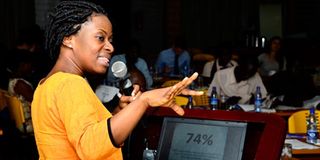MPs decry excessive use of poll funds

The Executive Director of Anti-Corruption Coalition Uganda, Ms Cissy Kagaba, addresses journalists in Kampala yesterday over the findings. PHOTO BY DOMINIC BUKENYA.
What you need to know:
It is noted that Ugandans are deprived of a chance to objectively choose leaders because of large amounts of money in circulation during elections.
Kampala
A year to the 2016 general elections, at least seven out of every 10 MPs recently interviewed say they would want the amount of money spent on campaigns by political parties and presidential candidates restricted.
The demand is contained in the results of a survey, ‘Who Pays the Piper’ commissioned by Alliance for Campaign Finance Monitoring (ACFIM) released yesterday focusing on the attitudes of parliamentarians towards vote buying and selling.
“Money in politics is ingrained in our system. There is a bidding [war] which is not determined by the population but which the population is taking advantage of,” Mr Henry Muguzi, the national coordinator of ACFIM, said.
Mr Muguzi said Ugandans are deprived of a chance to objectively determine who their leader should be because of the large amounts of money which are in circulation during elections. Six out every 10 MPs also said the amount of money to be spent by candidates running for a parliamentary seat should be capped.
Those for and against whether a candidate who spends above the legally stipulated limit on their campaign expenditure should lose their seat and be disqualified from contesting in any elections again were evenly split at 47 per cent.
Yesterday, Opposition chief whip Cecilia Ogwal (Dokolo Woman) told Daily Monitor that Uganda doesn’t only need change of policies or new election laws but an overhaul.
“While a law is important, the system has to change because we have a corrupt government in place,” Ms Ogwal said and suggested that spending should not go beyond Shs50 million.
However, Dr Kenneth Omona, the NRM party deputy treasurer, said placing a cap on campaign spending is unnecessary.
“To set a limit doesn’t make a lot of sense because different areas are at different development levels and therefore difficult to determine the ceiling. We must instead discourage the commercialisation of politics because it gives much better value,” he said. While disseminating yesterday’s findings, Ms Cissy Kagaba, the executive Director of Anti-Corruption Coalition Uganda, was sceptical about MPs enacting the required legislation. “By MPs enacting legislation, it will work against them. They tend to want to make legislation for other people,” Ms Kagaba said.
However, Mr Charles Mwangushya Mpagi, the communications manager of Citizens’ Coalition for Electoral Democracy disagreed, stating that it is all about timing.
“I think it is actually possible to pass the law but the question of timing needs to be brought in first. If you went with such legislation to Parliament now, you wouldn’t make any headway,” Mr Mpagi said.
Eighty one per cent (Opposition) 77 %( Independent) and 63 %( NRM) members surveyed said it is wrong and punishable for candidates for political office or people from political parties to offer money to voters in return for their votes.
Only two per cent of the members from NRM surveyed said it is ‘not wrong at all’. However, 34 %( NRM), 19% (opposition) and 24 %( Independent) said it is wrong but understandable when a similar question was posed to them.
When a similar question was posed but in relation to a voter accepting money in return for their vote, 2% of NRM legislators said it is not wrong at all to do so while 55% from the same party said it is wrong and punishable to do it with 42% (NRM) saying it is wrong but understandable.
When it came to members from the opposition, 66 percent said it is wrong and punishable with 34 per cent saying it is wrong but acceptable. Like those in the opposition no member from the independents fully agreed with the study question. 65 percent independents said it is wrong and punishable while 35 percent said it is wrong but acceptable.
The study revealed that 79 percent of the MPs sampled said their ‘personal resources’ were the most important source for financing their election campaign with 39 percent of the MPs saying ‘donations from the party’ were their second most important source for financing their election campaign.


